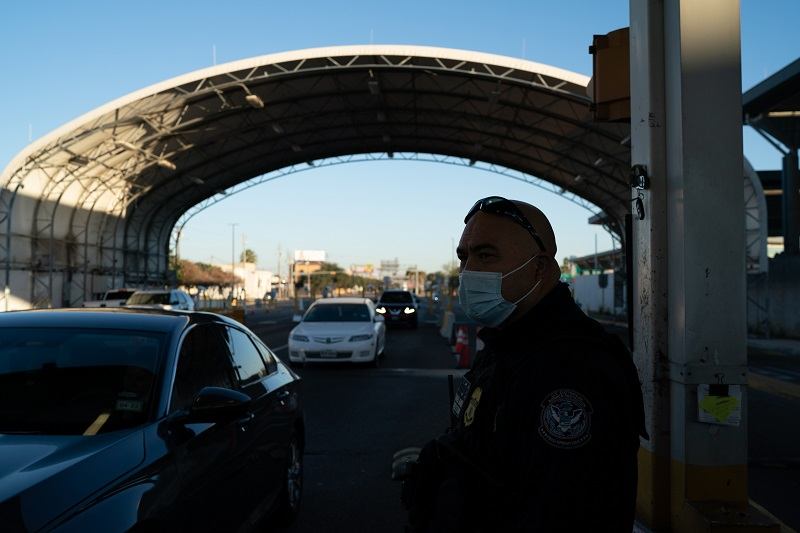Supreme Court clears Biden to shut down Trump-era ‘Remain in Mexico’ policy for asylum seekers

Migrants from Central America walk along the U.S.-Mexico border near Sasabe, Ariz., on Jan. 23, 2022.
13:37 JST, July 1, 2022
The Supreme Court on Thursday ruled for the Biden administration on a controversial immigration policy, saying it had the authority to reverse a Trump-era initiative that requires asylum seekers to remain in Mexico while their cases are reviewed in U.S. courts.
Lower courts had gone too far in requiring President Joe Biden to keep in place policies that intruded on his ability to carry out the nation’s immigration procedures and foreign policy, wrote Chief Justice John Roberts. It was a rare win for the administration at the Supreme Court this term, and for the court’s liberal members, who found themselves in the majority.
The vote was 5-4, with Roberts writing for himself and fellow conservative justice Brett Kavanaugh, plus Justices Stephen Breyer, Sonia Sotomayor and Elena Kagan from the left.
At issue were the Migrant Protection Protocols (MPP) put in place by the Trump administration. Better known as the “Remain in Mexico” policy, it requires some asylum seekers who enter the country illegally, mainly from Central and South America, to return to Mexico while they await a hearing. President Donald Trump said the program was necessary to curb what his administration characterized as a flood of meritless asylum claims by migrants seeking to be released into the United States.
The justices had expedited review of Biden’s attempt to get rid of the policy after a lower-court judge said that the administration had not provided sufficient justification for ending it and that its procedures were unlawful.
Roberts said federal immigration law gives the executive discretion: He may return asylum seekers to Mexico but is not required to do so.
Justices Clarence Thomas, Samuel Alito, Neil Gorsuch and Amy Coney Barrett dissented. Barrett said she agreed with much of the majority’s reasoning but thought that the court should not have decided the case and should have remanded it to lower courts.
Kavanaugh noted in a concurring opinion that this means six justices agreed on the merits and said the court can do only so much to restore order in an immigration crisis brought about by a “stalemate” between Congress and the White House.
“The larger policy story behind this case is the multi-decade inability of the political branches to provide [the Department of Homeland Security] with sufficient facilities to detain noncitizens who seek to enter the United States pending their immigration proceedings,” Kavanaugh wrote. “But this Court has authority to address only the legal issues before us.”
Alito, writing for himself, Thomas and Gorsuch, said the DHS should not be free to “simply release into this country untold numbers of aliens who are very likely to be removed if they show up for their removal hearings. This practice violates the clear terms of the law, but the Court looks the other way.”
Judy Rabinovitz, special counsel with the American Civil Liberties Union’s Immigrants’ Rights Project, praised the ruling.
“The Supreme Court was right to reject the spurious argument that this cruel policy is statutorily required,” she said in a statement.
“While, as noted in the decision, the case will return to the district court, the Biden administration can and should move forward swiftly to finally terminate ‘remain in Mexico’ for good – a result that has been long, and unjustly, delayed.”
Shortly after taking office in January 2021, Biden said the administration would not continue enrolling migrants in the MPP and ordered a review. He and immigration rights groups said the policy was subjecting asylum seekers to dangerous conditions such as rape and torture and complicating their legal proceedings in the United States. The program’s benefits, the Biden administration said, were “outweighed by its domestic, humanitarian, and foreign policy costs.”
But U.S. District Judge Matthew Kacsmaryk of Texas ruled that the Biden administration did not adequately explain its reasons for canceling the policy and that its new procedures violated federal immigration law. A panel of the U.S. Court of Appeals for the 5th Circuit upheld his decision, and the Supreme Court last summer refused the administration’s request to intervene. Instead, it scheduled an expedited hearing.
Roberts said the decision centered on language in the immigration law that says, “In the case of an alien . . . who is arriving on land . . . from a foreign territory contiguous to the United States, the [homeland security secretary] may return the alien to that territory pending a proceeding.”
Republican-led states that wanted “Remain in Mexico” to stay in place persuaded lower courts that if the United States does not have the capacity to detain all asylum seekers until their hearing – and all agree no administration has ever been able to do that – that section of the law mandates sending the immigrants back to another country.

A U.S. Customs and Border Protection officer watches vehicles at the U.S.-Mexico border crossing in Laredo, Texas, on Jan. 14, 2022.
“The problem is that the statute does not say anything like that,” Roberts wrote. “The statute says ‘may.’ And ‘may’ does not just suggest discretion, it ‘clearly connotes’ it,” referring to a previous court ruling.
Roberts noted that since the law was written 26 years ago, “every Presidential administration has interpreted” the section as “purely discretionary.”
The chief justice said the “foreign affairs consequences of mandating the exercise of contiguous-territory return likewise confirm” that lower courts had misread the law.
MPP applies exclusively to non-Mexican nationals, who must be returned to Mexico, Roberts noted. The lower courts “force the Executive to the bargaining table with Mexico, over a policy that both countries wish to terminate, and to supervise its continuing negotiations with Mexico to ensure that they are conducted ‘in good faith,’ ” Roberts wrote. “That stark consequence confirms our conclusion that Congress did not intend [the law] to tie the hands of the Executive in this manner.”
Roberts additionally said the lower courts were wrong to reject a DHS memorandum detailing the reasons for ending the “Remain in Mexico” policy as an after-the-fact rationalization of Biden’s instinct to end the program. In returning the case to the district judge, he said it should be evaluated anew as justification for ending the program.
Alito said he agreed with Barrett that the court should have vacated the judgments of the lower courts and sent it back for a new look.
But he also said the majority’s “analysis of the merits is seriously flawed.”
“The majority errs in holding that the [law] does not really mean what it says when it commands that the aliens in question ‘shall’ be detained pending removal or asylum proceedings unless they are either returned to Mexico or paroled on a case-by-case basis,” Alito wrote. “According to the majority, it is fine for DHS simply to release these aliens en masse and allow them to disappear.”
Alito also disputed that the lower courts’ reading of the law would too severely limit the president’s power to conduct foreign policy.
“The President has vital power in the field of foreign affairs, so does Congress, and the President does not have the authority to override immigration laws enacted by Congress,” he wrote.
After the lower courts’ decisions, the Biden administration restarted the program. While federal law requires the government to detain all noncitizens who enter the United States illegally, Congress has never provided sufficient funding to do so. In 2021, the DHS processed more than 671,000 people along the southern border but had funding to detain only about 34,000 nationwide.
"News Services" POPULAR ARTICLE
-

Japan’s Princess Kako Marks 31st Birthday, Contributed to Key Events This Year
-

Arctic Sees Unprecedented Heat as Climate Impacts Cascade
-

Brigitte Bardot, 1960s Sultry sex Symbol Turned Militant Animal Rights Activist Dies at 91
-

At Least 7 Explosions and Low-Flying Aircraft Are Heard in Venezuela’s Caracas
-

South Korea Prosecutor Seeks Death Penalty for Ex-President Yoon over Martial Law (Update)
JN ACCESS RANKING
-

Japan Govt Adopts Measures to Curb Mega Solar Power Plant Projects Amid Environmental Concerns
-

Core Inflation in Tokyo Slows in December but Stays above BOJ Target
-

Major Japan Firms’ Average Winter Bonus Tops ¥1 Mil.
-

Tokyo Zoo Wolf Believed to Have Used Vegetation Growing on Wall to Climb, Escape; Animal Living Happily after Recapture
-

JAL, ANA Cancel Flights During 3-day Holiday Weekend due to Blizzard



























